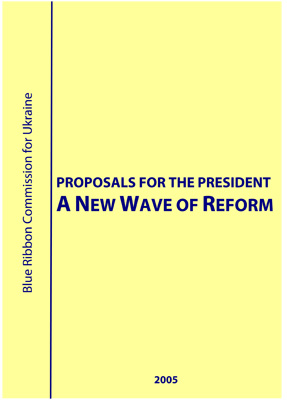On the fourth anniversary of Russia’s full-scale invasion, Carnegie experts discuss the war’s impacts and what might come next.
- +1
Eric Ciaramella, Aaron David Miller, Alexandra Prokopenko, …

A commission of leading international and Ukrainian experts has drafted a report providing over a hundred specific policy recommendations to the new president. The report urges the new administration to undertake a sweeping new wave of reform, with the aim of recasting relations between state and society, sustaining current high rates of growth, and broadening the reach of prosperity.
The outcome of Ukraine’s presidential elections has created an opportunity for dramatic change in the way the country is governed. Anticipating this possibility, a Blue Ribbon Commission composed of leading international and Ukrainian experts has drafted a report providing over a hundred specific policy recommendations to the new President. The authors of the report urge the new administration to undertake a sweeping "new wave" of reform, with the aim of recasting relations between state and society, sustaining current high rates of growth, and broadening the reach of prosperity. The report will be presented to Viktor Yushchenko on the eve of his inauguration, and publicized widely among policy makers, business leaders, and journalists, both in Ukraine and abroad.
The report identifies five key areas for reform. First, and most urgent, is political reform. The fundamental problem in Ukraine, as in other postcommunist countries, is that the state rules its citizens, rather than serving them. The relationship between state and citizens must change, the report concludes. To win the confidence of its citizens, the state machinery must become efficient through real control by society and law. Second, social spending in areas such as health care and education needs to be made more effective so that it benefits the truly needy, rather than mainly the well-off, as is now the case. Third, the tax system and the legal foundations of the financial system need to be overhauled so that they work to stimulate economic growth. Fourth, a clear line must be drawn between the state and private enterprise, so that property rights are fully guaranteed. Fifth, integration into the world economy must be facilitated through early accession to the World Trade Organization (WTO) and closer integration with the European Union (EU).
The report is designed to be a hands-on document of genuine practical use to the new administration in Ukraine, with most measures designed for enactment within the new President’s first year in office. Of the report’s many specific policy recommendations, the Blue Ribbon Commission has identified the following 12 as the most urgent:
"We recommend this report as a practical checklist of ‘second wave’ political and economic reforms—not just for Ukraine, but also for many other former Soviet countries where recent spurts of economic growth have not been matched by the far-reaching structural reforms needed to secure democratic governance and combat poverty," said Kalman Mizsei, the UN Assistant Secretary General and UNDP Assistant Administrator who helped create the Blue Ribbon Commission and served as a member.
The Blue Ribbon Commission, formed in July 2004, was co-chaired by Anders Åslund, Director of the Russian & Eurasian Program at the Carnegie Endowment for International Peace in Washington, D.C., and Oleksandr Paskhaver, President of the Kyiv-based Center of Economic Development. Other commission members included Iryna Akimova, Dan Bilak, Ihor Burakovsky, Oleksandr Chalyi, Keith Crane, Marek Dabrowski, Adrian Karatnytcky, Ihor Koliushko, Oleksandra Kuzhel, Dmytro Leonov, Georges de Menil, Vira Nanivska, Jerzy Osiatynski, Oleksandr Rohozynsky, Oleksandr Shevtsov, and Ben Slay. UNDP’s office in Ukraine provided the funding for the project, but the Blue Ribbon Commission enjoyed full freedom in defining recommendations and drafting the report.
Click on the link above for full text of the Report in English and Ukrainian.
About UNDP
UNDP is the UN’s global development network, focused on helping countries build and share solutions to the challenges of democratic governance, poverty reduction, HIV/AIDS, crisis prevention and recovery, energy and environment, and information and communications technology. We are on the ground in 166 countries, working with them on their own solutions to global and national development challenges. For information see www.undp.org

Former Senior Associate, Director, Russian and Eurasian Program
Oleksandr Paskhaver
Center of Economic Development (Kyv, Ukraine)
Carnegie does not take institutional positions on public policy issues; the views represented herein are those of the author(s) and do not necessarily reflect the views of Carnegie, its staff, or its trustees.
On the fourth anniversary of Russia’s full-scale invasion, Carnegie experts discuss the war’s impacts and what might come next.



Eric Ciaramella, Aaron David Miller, Alexandra Prokopenko, …
The use of technology to mobilize Russians to vote—a system tied to the relative material well-being of the electorate, its high dependence on the state, and a far-reaching system of digital control—is breaking down.

Andrey Pertsev
Putin is stalling, waiting for a breakthrough on the front lines or a grand bargain in which Trump will give him something more than Ukraine in exchange for concessions on Ukraine. And if that doesn’t happen, the conflict could be expanded beyond Ukraine.

Alexander Baunov
The pace of change in the global economy suggests that the IMF and World Bank could be ambitious as they review their debt sustainability framework.
C. Randall Henning
As discussions about settlement and elections move from speculation to preparation, Kyiv will have to manage not only the battlefield, but also the terms of political transition. The thaw will not resolve underlying tensions; it will only expose them more clearly.

Balázs Jarábik